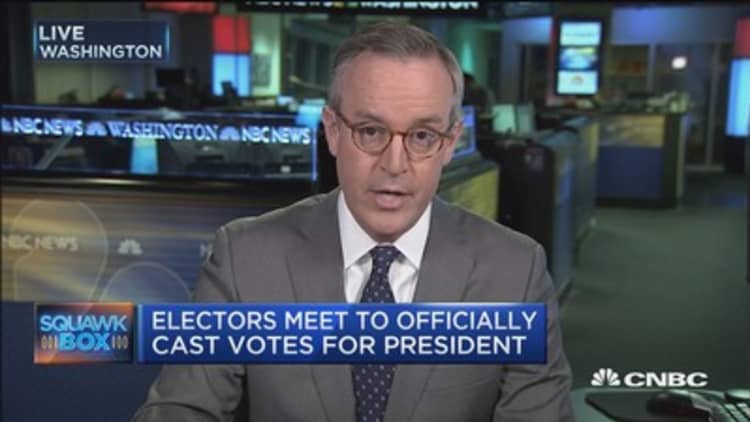
In the aftermath of a wild, norm-busting 2016 campaign, it's only fitting that Monday's Electoral College vote — the next step in formalizing Donald Trump's election to the presidency — has generated frenzied, star-studded arguments to somehow change the results.
But regardless of whether you view these efforts as proper and legitimate uses of Constitutional authority, sour grapes or just democracy's version of primal scream therapy, don't expect any reversal of November's overall result.
The weeks since the election have seen an unprecedented number of headlines teasing various scenarios about changing the results in the Electoral College — whose 538 members meet Monday in the 50 state capitals to cast their official votes. Trump won the Electoral College, 306 votes to Hillary Clinton's 232, but lost the popular vote by over 2.5 million votes, the third worst margin since 1824.
A handful of Democrats and even a few Republican electors have embarked on an unusual effort to deny Trump the victory — or at the very least, raise the specter of changing the election.
Electors in three states have gone to court seeking the chance to vote their mind; another resigned to avoid the vote altogether. One Republican elector in Texas has publicly said he will not vote for Trump, although his state voted overwhelmingly for the GOP candidate.
More from NBC News
The 'Real' Presidential Vote: Electoral College Votes on Monday
Muslim Americans: Hate Crime False Reports Hurt Community
West Virginia: How the Bluest State Became the Reddest
And a group of about 80 electors (including one Republican) signed on to a letter to National Intelligence Director James Clapper asking for a briefing on the role Russian hacks may have played in the election before the vote. (That request, supported by Hillary Clinton's campaign chair John Podesta, will not be granted, the Office of the Director of National Intelligence said.)
Activists, meanwhile, have taken up the cause. A petition aimed at "conscientious electors" has garnered nearly 5 million signatures. The West Wing's fictitious president, Martin Sheen, and a slew of actors released a YouTube appeal pleading with electors to give the election to Clinton, or anyone other than Trump.
On "Saturday Night Live," comedian Kate McKinnon revived her Clinton impression to show up at the house of an elector and spoof the cue card scene from the holiday movie "Love Actually."
"Just vote for literally anyone else," one of the cards read.
Constitutionalists argue that the electors are free to vote however they please, although 29 states have Supreme Court-upheld laws requiring them to vote as their state did. The constitutionality of enforcing those laws, however, has never been tested.
But even if these efforts worked to deny Trump the 270 votes, they are not aimed at boosting Clinton. The election would be sent to the House of Representatives where Republicans have a large advantage, meaning Trump would still almost certainly still be president.
All these machinations are another sign of just how hugely partisan and unusual 2016 was. In past elections, few have acted as so-called "faithless" electors. Since 1948 there have only been nine of them. Even in the disputed 2000 presidential election, when passions ran almost as high as today, no electors changed their votes and just one abstained. That was in protest over D.C.'s lack of voting representation in Congress.
Experts say the only real effect of Monday's vote might be a civics lesson for America.
"For citizens, they tend to learn something from these car crashes," legal analyst Jonathon Turley said, recalling the 2000 election's startling reminder that a majority of Americans don't necessarily elect presidents in America.
"This raises the question: Do we need electors?" said George C. Edwards III, a Texas A&M professor and author of "Why The Electoral College is Bad for America." "This increases awareness and sensitivity of the problems of the Electoral College. That in turn might have a longer term impact on the structure of American politics."
Still, both say it's unlikely the Electoral College will be changed, either.
"Republicans have fallen back in love with the Electoral College because they view it as a protection of small states, some Democrats have fallen back in love with the Electoral College because it's viewed as a fail safe mechanism against candidates like Donald Trump," Turley said. "As a result, the Electoral College has never been more popular."
Support for the Electoral College rose in the weeks following the election. According to a Gallup survey, 47 percent said they favored keeping the current electoral system, up from 35 percent four years ago. Slightly more, 49 percent, favor amending the Constitution to get rid of the system, but that's down from 62 percent four years ago.
But few elected officials — and even fewer Republicans, for whom empowering urban electorates would seem a death knell — are on board, and critics say a surge in popularity makes change unlikely.
"It was already difficult to talk to members about removing the Electoral College — I know because I've tried — but it's almost impossible when it's experiencing a surge of popularity," Turley added

